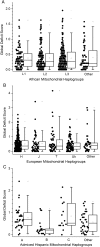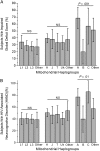Mitochondrial DNA Haplogroups and Neurocognitive Impairment During HIV Infection
- PMID: 26129753
- PMCID: PMC4599391
- DOI: 10.1093/cid/civ527
Mitochondrial DNA Haplogroups and Neurocognitive Impairment During HIV Infection
Abstract
Background: Neurocognitive impairment (NCI) remains an important complication in persons infected with human immunodeficiency virus (HIV). Ancestry-related mitochondrial DNA (mtDNA) haplogroups have been associated with outcomes of HIV infection and combination antiretroviral therapy (CART), and with neurodegenerative diseases. We hypothesize that mtDNA haplogroups are associated with NCI in HIV-infected adults and performed a genetic association study in the CNS HIV Antiretroviral Therapy Effects Research (CHARTER) cohort.
Methods: CHARTER is an observational study of ambulatory HIV-infected adults. Haplogroups were assigned using mtDNA sequence, and principal components were derived from ancestry-informative nuclear DNA variants. Outcomes were cross-sectional global deficit score (GDS) as a continuous measure, GDS impairment (GDS ≥ 0.50), and HIV-associated neurocognitive disorder (HAND) using international criteria. Multivariable models were adjusted for comorbidity status (incidental vs contributing), current CART, plasma HIV RNA, reading ability, and CD4 cell nadir.
Results: Haplogroups were available from 1027 persons; median age 43 years, median CD4 nadir 178 cells/mm(3), 72% on CART, and 46% with HAND. The 102 (9.9%) persons of genetically determined admixed Hispanic ancestry had more impairment by GDS or HAND than persons of European or African ancestry (P < .001 for all). In multivariate models including persons of admixed Hispanic ancestry, those with haplogroup B had lower GDS (β = -0.34; P = .008) and less GDS impairment (odds ratio = 0.16; 95% confidence interval, .04, .63; P = .009) than other haplogroups. There were no significant haplogroup associations among persons of European or African ancestry.
Conclusions: In these mostly CART-treated persons, mtDNA haplogroup B was associated with less NCI among persons of genetically determined Hispanic ancestry. mtDNA variation may represent an ancestry-specific factor influencing NCI in HIV-infected persons.
Keywords: AIDS; DNA, mitochondrial; HIV; cognitive disorders.
© The Author 2015. Published by Oxford University Press on behalf of the Infectious Diseases Society of America. All rights reserved. For Permissions, please e-mail: journals.permissions@oup.com.
Figures


References
Publication types
MeSH terms
Substances
Grants and funding
LinkOut - more resources
Full Text Sources
Other Literature Sources
Medical
Research Materials

